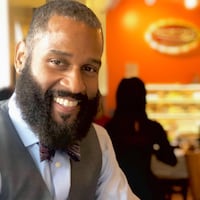A South Georgia teacher paralyzed from the chest down in a May waterslide accident has returned home after nearly six months of rehabilitation in Atlanta, according to reports.
Valerie Feske, an educator at Richmond Hill Middle School near Savannah, had been playing with children on an inflatable slide over Memorial Day weekend when someone crashed into her from behind, causing the debilitating spinal cord injury.
»PREVIOUS COVERAGE: Georgia teacher paralyzed after accident on inflatable waterslide
“There was a collision, and I was hit in the back of the neck,” Feske told NBC affiliate WSAV in an exclusive report on her recovery. “Immediately, I was submerged underwater and realized I could not get up with my legs ... Somehow, I think I pushed myself up with my hands and arms and said, ‘I need help,’ and then I was just really scared.”
After being pulled from the water, Feske said she suddenly had no feeling throughout her body.
She was taken to the intensive care unit at Memorial Health University Physicians hospital in Richmond Hill, where she had at least one surgery and regained some movement in her arms, family said at the time.
From there, she was transported four hours to Atlanta’s Shepherd Center, a rehabilitation clinic for spinal cord and brain injuries, where she spent the next several months in physical therapy, WSAV reported.
“I had to learn how to brush my teeth, feed myself, sit up again,” Feske said, according to the station. “From the chest down, I’m not able to kind of move those extremities, so I had to learn how to do that myself, basically using my arms and my shoulders to support myself from the waist down to move my legs.”
Feske also said she has regained some muscle strength and finally is able to reach her head with her hands. Sensation in her legs, stomach and torso have also returned somewhat, WSAV reported.
“I’m getting some abs that are firing back, so that’s good and will help a lot when it comes to trying to sit up,” she said.
Only two weeks ago, Feske said her right thumb began to move again.
“When I got to the Shepherd Center, I mean, I couldn’t take a sheet and cover myself up; that’s how weak I was, and now I can roll around in the bed,” Feske said, adding, “It takes a lot of work, but I can do it, I have come a long way.”
Despite her progress, physicians are not sure whether the wife and mother of two will walk again.
“That’s the tricky thing with spinal cord injuries is that every person is different,” Feske said. “They can do scans, but they don’t know what will come back and what doesn’t, so we’re not sure.”
Feske said the emotional toll has been the most painful experience of the ordeal. Family members were only granted limited access to visit her at the Shepherd Center because of coronavirus restrictions, the station reported.
“I wasn’t able to see my kids unless they stood on a fence that was about 10 feet away from me on busy Peachtree Street, so that was the hardest part,” she said, adding that she was also frustrated by her inability to do simple tasks on her own.
“Not being able to hold yourself up or relying on people all the time to get stuff for you, I think that’s hard, too,” Feske said. “You don’t realize how much you just do for yourself all the time.”
During the first three months at the Atlanta facility, Feske said she had no way to floss.
“It was horrible!” Feske said. “The first day Brent was able to come [visit], I think I was like, ‘Floss my teeth, please!’ So, it’s just the little things that you can’t do anymore, it made it really hard,” she told WSAV.
Feske left Atlanta three weeks ago and returned to Richmond Hills to continue rehabilitation at home, where specialists visit her several days per week.
She said she’s staying positive and taking things one day at a time.
“I would love to walk again, but I would love to be able to use my fingers again, or just be able to fold my torso up, so even something like that would be great,” Feske laughed softly, according to WSAV. “Walking might be on the bottom of the list now, to be honest.”
A Facebook group called Val’s Village has been set up to help support the family and raise funds for Feske’s care.
About the Author
Keep Reading
The Latest
Featured


